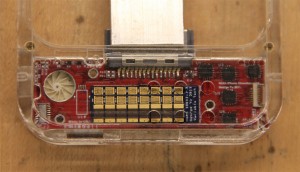 For a number of years now NASA Ames scientist Jing Li has been hard at work developing what Gizmodo recently called the "greatest phone accessory of all time." The tech publication had an exclusive look Li's gadget, a postage-sized chip with 32 nanosensor bars, each made up of a different nano-structure material that can respond to different chemicals in different ways. The chip requires about 5 milliwatts of power so it can run for 8 continuous hours on a single charge when connected to a smartphone. Gizmodo strongly suggests the device is designed to connect to Apple's iPhone and may not be too far away from commercialization.
For a number of years now NASA Ames scientist Jing Li has been hard at work developing what Gizmodo recently called the "greatest phone accessory of all time." The tech publication had an exclusive look Li's gadget, a postage-sized chip with 32 nanosensor bars, each made up of a different nano-structure material that can respond to different chemicals in different ways. The chip requires about 5 milliwatts of power so it can run for 8 continuous hours on a single charge when connected to a smartphone. Gizmodo strongly suggests the device is designed to connect to Apple's iPhone and may not be too far away from commercialization.
A Chattanooga, Tennessee-based startup called VariableTech seems to be helping Li develop the device. VariableTech appears to be set to launch a KickStarter campaign to help fund the development of the consumer-facing devices, too.
The device is chiefly designed to monitor carbon monoxide in the user's home along with real-time tracking of levels of chlorine, ammonia and methane in the immediate environment. Gizmodo suggests that a companion app could send data back to the Department of Homeland Security, which is funding much of the research that will lead to a consumer version of the device.
A version of the device has been installed on the International Space Station for about three years now. It monitors fuel leaks in launch vehicles and also monitors air quality -- especially formaldehyde -- in the air inside the ISS.
Gizmodo suggests that people with diabetes could use a version of the device to detect their blood sugar level, which correlates with acetone in the breath. Another correlation exists between nitrous oxide in the breath and lung cancer. The device certainly has the potential to become a critical tool or a contender for the X Prize's Qualcomm-sponsored Tricorder competition.
Read the Gizmodo article here.















